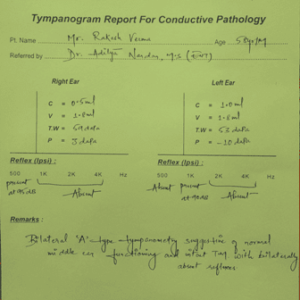How I Cured My Tinnitus
Tinnitus is a disease in which the patient keeps feeling many types of sounds, like bell ringing, buzzing or whispering sound, etc. McFadden has defined sound as conscious sound, which originates in the patient’s head, that too without any external source.
Such a sound may be heard in one or both ears, although the patient sometimes has the illusion that the sound is coming from his head.
There are different types of tinnitus sound, in which its tone can be high or low or changing, sometimes this sound can be continuous or sometimes intermittent and the intensity of this sound can sometimes be fast, slow, or May be changing. Might be possible.
In general, the presence of tinnitus is ubiquitous in people. It affects people of all age groups but increases with age. It can occur in people of both sexes but is more commonly seen in men. Tinnitus may be accompanied by hearing loss, although this is not always the case.
Discovery of serous otitis media
Serous otitis media is another condition that can contribute to tinnitus. It is important for anyone seeking relief from the constant ringing bell to understand its implications.
The patient should be studied thoroughly to find out where the sound is coming from, what type it is, and how it affects the patient’s lifestyle. There are two types of tinnitus –
Subjective: This type of sound is heard only by the patient.
Objective: This type of tinnitus is audible to both the patient and the doctor.
Some of the main causes of tinnitus are:
- Hearing loud noises
- Loss of hearing due to increasing age i.e. presbycusis
- Earwax
- Injury- deep injury on head, injury on neck
- Ear infections – Serous otitis media, secretory otitis, labyrinthitis.
- Medicines – Tinnitus can also be caused by some medicines – like aspirin, anti-malarial drugs like – quinine, and chloroquine, mycin group antibiotics like gentamicin, streptomycin, chemotherapy drugs, and some diuretics.
- Medical conditions like high blood pressure, anemia, thyroid disorders, diabetes, etc.
- Meniere’s disease.
- Tumors of the cerebellopontine angle such as acoustic neuroma.
- Excessive caffeine intake
- Alcohol abuse
- Migraine
Tests to Diagnose Tinnitus
Audiometry: This is done to check the hearing loss, intensity of tinnitus, its level, etc. Tinnitus is often associated with changes in hearing levels.

Tinnitus Matching: The patient is tested for tinnitus of different intensities. The patient is asked to identify a sound that is similar to the tinnitus sound they hear inside. After matching the frequency of the sound, its level and intensity are also matched. Different diseases may be associated with different types of tinnitus. Low-pitched sounds are seen in patients with Meniere’s disease while high-pitched sounds are seen in patients with ototoxicity.
Impedance audiometry: This is done to check the functioning of the Eustachian tube, middle ear pressure, ossicular chain integrity, and Stepidial reflex.

MRI: In some cases, imaging such as MRI is required where tumors of the CP angle, such as acoustic neuroma, are suspected.
How I Cured My Tinnitus- Tips to Deal with Tinnitus
Increasing surrounding noise: Listening to music at low volume can distract the patient from tinnitus.
Avoiding silence: The sound of tinnitus is often more disturbing in the silence of the morning or night. The patient should avoid excessively quiet or silent conditions, as in such cases the sound of tinnitus becomes louder and bothersome.
Avoid smoking: Smoking causes the arteries that supply blood to the auditory nerve to narrow, restricting blood flow to sensitive auditory cells and increasing tinnitus.
A complete prohibition of Alcohol.
Loud Noise Protection: If you work in an environment where there are loud noises all around, you should wear ear protection to protect your delicate auditory nerves from damage.
Myths related to tinnitus
- This is an incurable disease.
- This causes loss of hearing power.
- Hearing aids do not help.
- One is an indicator of some brain disease.
- This is fatal.
If proper evaluation and testing are done and the diagnosis is made at the right time, tinnitus can be completely cured.
Tinnitus and Treatment
Treatment of tinnitus depends on what is causing the disease. Tinnitus can be controlled by treating it based on the following causes.
Devices used in the treatment of tinnitus:
Hearing aids:
When tinnitus and deafness are present together, amplification of sound improves hearing and also improves tinnitus.
Masking devices:
These devices produce additional sound in the ear, providing relief from the painful sound of tinnitus. It is a type of white noise that is not painful and distracts from the constant incoming sound. Because of the association with tinnitus, it becomes easier for the doctor to decide the frequency of maskers.
Tinnitus Retraining Therapy:
Jester Baugh proposed this therapy as habituation therapy. In this treatment, the patient uses a mask that produces sound at a very low amplitude, so that the patient’s attention can be diverted from the irritating sound of tinnitus.
Patients are given counseling sessions so that they can perceive the sound of tinnitus as a normal condition at a subconscious level and not be bothered by it. This treatment is considered very effective. However, it is necessary to follow it for at least 12-18 months to get proper results.
Biofeedback:
This is a relaxation-based technique in which the patient is taught to control the stress response to a painful tinnitus sound.
Cognitive Therapy:
Under this treatment, the patient is given intensive counseling regarding the emotional focus, perceived impact, and stress reactions of the body of tinnitus.
Cochlear Implant:
For patients who have severe hearing problems and suffer a lot, their tinnitus can be controlled through a cochlear implant and their hearing power also improves.
Tinnitus Treatment Therapy
My Journey: Holistic Healing with Natural Remedies
Hear! Have you ever suffered from that annoying ringing in your ears? I also did this. but guess what?
In this blog, I will share those easy remedies and lifestyle changes that worked wonders for me.
Holistic Treatment:
First things – I learned that fixing everything in my life helped my ear condition a lot. Eating well, staying calm, and being mindful – these simple things formed the foundation of my journey to silence the bells.
Calm environment of nature:
Nature became my friend in this journey. Picture this – peaceful greenery and calming sounds. Find out what difference walking in nature made in stopping the constant ringing in my ears.
Quiet time with meditation:
Now, I’m no meditation guru, but I found this very helpful. I will share some easy tips on how you can meditate and bring some peace into your noisy life.
Herbs that help:
Turns out, some herbs are like little heroes for your ears. From ginkgo biloba to lavender, learn how these natural helpers can soothe your irritated ears.
Sounds for peace:
Imagine a symphony that helps you relax. That’s sound therapy! Pay attention to how specific sounds can bring peace to your ears and make the constant buzzing disappear.
Precautions for peace:
There’s no magic here, just some mental tricks that worked for me. Learn how simple mind games and ideas can help you find peace and solace from the constant ringing of bells.
Yoga Vibes:
Yoga may seem strange, but believe me, it is not. Learn how simple yoga poses can be your ticket to a peaceful life. It’s like giving your ears a little rest.
FAQS about How I Cured My Tinnitus :
1.How did I cured my tinnitus with aggressive treatment?
I tackled my tinnitus head-on with aggressive treatment, combining therapies like sound masking, counseling, and specialized exercises. It wasn’t an instant fix, but over time, the intensity of the ringing decreased, and I regained a sense of peace in my daily life.
2. What is serous otitis media?
Serous otitis media is a condition where fluid accumulates behind the eardrum without an infection. It can cause hearing issues and a feeling of fullness in the ear, often linked to problems with the Eustachian tube.
3. What are the treatments for serous otitis media?
Treatment for serous otitis media often involves addressing the underlying cause, like allergies or Eustachian tube dysfunction. It may include medications, such as decongestants or nasal steroids, and in some cases, surgical intervention to drain the fluid and improve ear function.
4. What are effective overnight treatments for tinnitus?
Overnight relief for tinnitus varies, but some find comfort through white noise machines or soothing sounds. However, curing tinnitus usually involves a gradual approach, combining lifestyle changes, stress management, and potential professional therapies for lasting results.
5. Is tinnitus a precursor to dementia?
No, having tinnitus doesn’t mean you’ll develop dementia. While both conditions may coexist, one doesn’t necessarily cause the other. It’s essential to address each condition independently and consult with a healthcare professional for personalized guidance.
6. How does one cure tinnitus with home remedies?
conclusion:
So, this is my story. I hope these simple tricks and ideas help you too. Whether you try some natural remedies, spend time in nature, or try yoga, there is a way for everyone to find peace from that constant bell.
I hope this blog makes your path to a sober life a little easier. Remember, you are not alone, and a peaceful silence awaits you.

